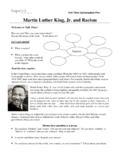Transcription of Racism A Learned Behavior - EssayJoint.CO.UK
1 Racism : A Learned Behavior I. Introduction Racism is one of the most controversial social topics in the world today even in the 21st century. As the term has been associated through the centuries for negative connotations such as discrimination, prejudice and even violence, Racism remains to be a volatile issue affecting millions of lives today. The definition of Racism is based on the belief that a particular race based on physical genetic features is more dominant than another. As such, the one that views that his or her ethnicity possesses human traits and capacities that are inherently superior compared to another is an exhibition of racist Behavior . As such, this belief becomes the basis for particular ethnic groups to discriminate on others that can be seen through institutional Racism .
2 This is when an entire ethic population denies another racial group basic civil liberties and benefits thus, continuing on the cycle of preferential treatment of a particular race. It is important to note that the United Nations has declared that racial discrimination and ethnicity discrimination are one and the same. Significantly, the partition of races can be traced back in history as early societies have traditionally divided human populations based on their race. As such, through the centuries sociologists, anthropologist and psychologists have tried to determine the root cause of Racism especially with the detrimental effects of discrimination as a result of racist beliefs. Thus, the effects of Racism continues to be a prevailing problem. It has been the cause of wars and conflicts throughout human history however, the question remains whether Racism is inherent to a person s genetic makeup or whether it is a Learned Behavior .
3 This paper will evaluate the different theories and studies on Racism to explore whether Racism is actually a Learned Behavior or not. More importantly, it will investigate theories to real life scenarios to determine if Racism is Learned or inherited. II. Literature Review A. Learned Behavior In order to answer the problem statement whether Racism is a Learned Behavior or not. It is first important to define Learned Behavior . According to psychologists and sociologists, Learned behaviors are a product of a person s observation. The application of the learning is because the person has deduced that this Behavior provides personal benefits. As such, Learned Behavior is a product of motivation wherein individuals are conditioned by their external environment to internalize the Behavior . Significantly, Learned Behavior is also a natural response of an individual as this is a result of a person s observations using the basic senses.
4 Thus, a Learned Behavior is a conditioned response to an external stimulus. This stimulus may or may not be intentionally done nevertheless the learning is passed on to the observer (Smith and Ross, 2006). Learned behaviors are also a result of experience as an individual reacts or erudite reflective actions. To distinguish Learned behaviors, crying for example is an instinctive human response. Babies themselves come out of the womb crying without anyone teaching them to do so. On the other hand, dressing one s self is a Learned Behavior as a child builds the capacity to choose and wear his own clothes based on the teachings of their parents who dress them. It is also important to note that scholars would like to distinguish Learned Behavior from innate Behavior .
5 Primarily, the difference is a matter of choice as an individual decides to learn a specific Behavior . The concept of choice and personal decision is important as a person chooses to learn how to read or write based on the behaviors seen amongst his peers or adults. Natural or innate behaviors are like crying and laughing which is born out of instinct and is not a Behavior one needs to learn based on observation. These natural behaviors are what many consider as raw emotional responses that are present in every man. It can then be correlated that Learned behaviors can be Learned or unlearned if an individual chooses to do so. More importantly, Learned behaviors are deliberate actions of an individual where his full consciousness is used to act on those behaviors. Second, Learned behaviors can also be habitual especially when this has been imbibed into the individual s consciousness system making the Behavior regardless whether it is right or wrong part of his or her own personality (Pachter et al.)
6 , 2010). There are some psychiatrists pioneering the study that Racism is a psychiatric disorder however, in general most agree that Racism is a Learned Behavior especially since an individual learns this belief system under a social context. For example, societies have practiced racial discrimination through three dominant methods through the centuries namely segregation, persecution and domination. Sociologists agree that these institutional forms of Racism reinforce the ideas that Racism is a Learned Behavior since it supports the agenda of racial superiority. It is also important to note that scholars in general agree that Racism amongst individuals is not a form of psychopathology even if there are some small research studies that have revealed that those with psychiatric disorders exhibit racist behaviors.
7 This however, does not adequately explain the centuries of segregation, persecution and domination of races even documented before biblical times. Some argue that behaviors are actually multidetermined which is a result of biological, psychological and sociological predetermination. As such, there are those who would contend that Racism is a form of mental illness and psychiatric disorder explaining that there is a pathological bias amongst humans in terms of ethnicity. However, those who support this perspective is in the minority considering the abundance of sociological, historical and anthropological research that contends this idea. In general, many agree that Racism remains to be a complex matter but all scientific fields of study agree nearly one hundred percent of the time that Racism is in fact, a Learned Behavior (Brewer, 2006).
8 Significantly, scholars cite that those who contend that Racism as a mental disorder is only referring to a small population of around five percent of individuals who are psychotic with high anxiety and personality disorders. As a whole the psychiatric community, agrees that the concept of fear is very much intertwined with Racism especially with two opposing viewpoints of public definition of Racism . Surveys have indicated that Caucasians whether American or European have recently adopted more tolerant views of other races. Significantly, many respondents prefer to focus on creating an ideal society that does not judge a person by their ethnic backgrounds. However, this in stark contrast to African Americans who when surveyed spoke about the reality of Racism in their daily lives.
9 In fact, they are surveyed to be extremely race sensitive as persecution and segregation was a large part of their history only being liberated in general in the 1960 s. They also responded to have experienced Racism itself through aggressions and insults as they have had to battle with stereotyping especially with their perceived lack of capacity and status (Doane, 2006). There have been recent genetic studies to try to determine whether the human DNA consists of a racist gene to which, no scientific evidence has yet to be discovered to support this theory. Many sociologists argue that to blame racist behaviors on the physical makeup of an individual is a very limited view considering this belief system has been in place for centuries. In fact, the creation of institutionalized Racism debunks the idea of racist genes.
10 As a consequence, sociologists state that humans have Learned to fear what they do not understand and significantly, conform when faced with mounting peer pressure. This is widely supported to have supported the existence of racist regimes citing the cultural and sociological external environment one lives in conditions a person to adapt and accept racist beliefs (Brewer, 2006). B. Political Ideas of Racism Many scholars cite how Racism is actually related to power as this is a common desire among man. It is the quest for power that has led people from the ancient times to conquer people from another land and build empires. It is the love for political, military and material strength that propagates racist ideas among societies. Significantly, the fear of losing this power also is a factor that fuels institutional Racism .





